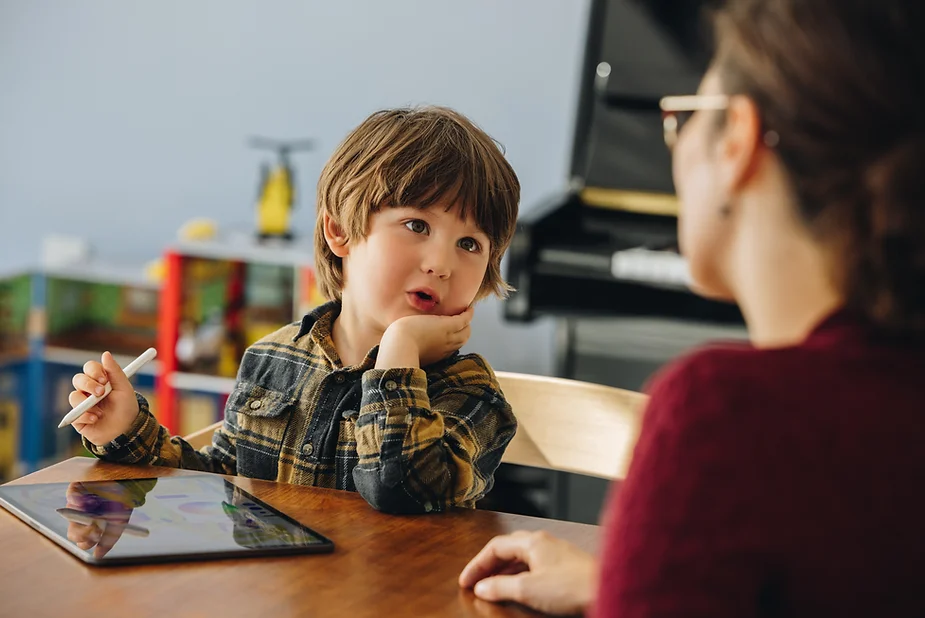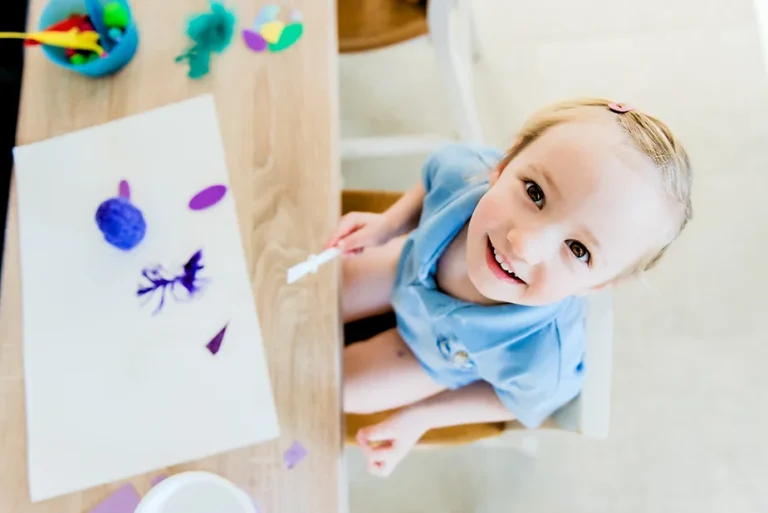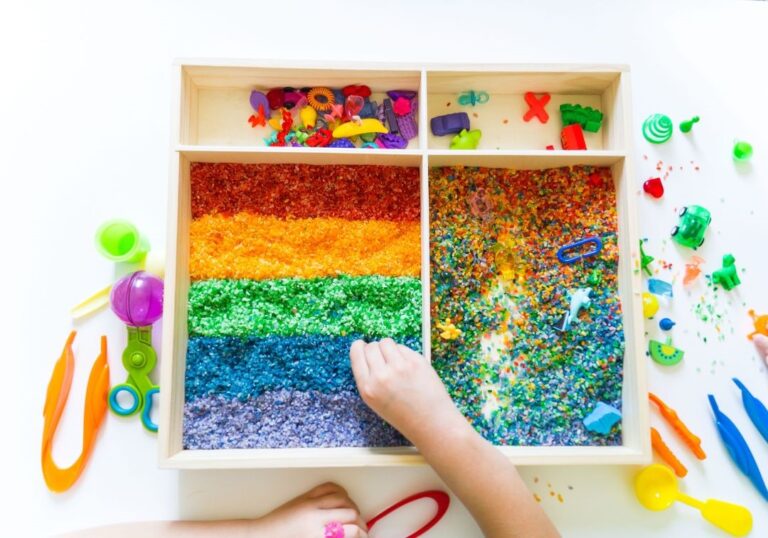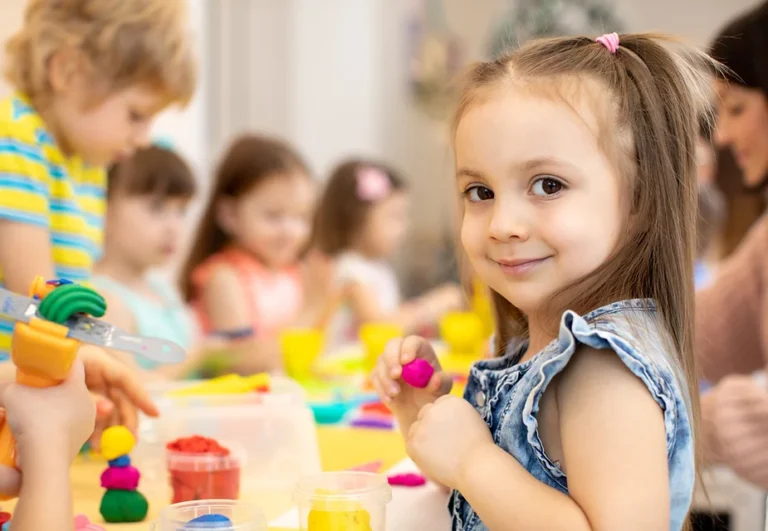What are the 5 Neurodivergent Love Languages?

Discover the Five Neurodivergent Love Languages: Info Dumping, Penguin Pebbling, Deep Pressure, Support Swapping, and Parallel Play. Learn how to connect meaningfully with your neurodivergent child!
This post may contain affiliate links and I could earn a small commission at no cost to you. However, I will never recommend anything that I do not believe in or use myself. You can read more about my disclosure policy here.
We all crave connection and understanding in our relationships, and many of us are familiar with the five traditional love languages: Words of Affirmation, Acts of Service, Receiving Gifts, Quality Time, and Physical Touch. These love languages, popularized by Dr. Gary Chapman, help us express and interpret love in meaningful ways.
They can be incredibly helpful for many people, including neurodivergent children, who may find that some of these traditional love languages resonate with them. However, for many neurodivergent kids, the traditional love languages don’t fully capture their unique ways of giving and receiving love.
Sensory sensitivities, communication styles, and different ways of processing the world can all influence how neurodivergent children experience affection and connection. This is why it’s important to explore and understand the neurodivergent love languages—ways of showing love that are just as valid and powerful, but tailored to the neurodivergent experience.
In this blog post, we’ll delve into five neurodivergent love languages. These love languages highlight the diverse and beautiful ways neurodivergent children connect with their loved ones. By embracing these expressions of love, we can foster deeper, more inclusive relationships that celebrate the uniqueness of every child.
Related: 10 Of The Best Children’s Books About Autism
Why Love Languages are Important for a Neurodivergent Child
Neurodivergent children often experience and interact with the world in ways that differ from neurotypical children. Understanding and catering to their love languages is crucial for several reasons.
Here’s a deeper look at why recognizing and responding to these love languages is so important:
Enhanced Communication
Communication can be a significant challenge for a neurodivergent child, who may have different ways of expressing and understanding emotions.
By identifying your child’s love language, you can communicate affection in a way that they clearly understand and appreciate, reducing the chances of miscommunication and helping them feel genuinely understood.
Using their preferred love language consistently sends clear and consistent messages of love and support, which is particularly important for a child who relies on routine and predictability.
Emotional Security
Feeling loved and valued is fundamental for every child’s emotional development.
When a child’s love language is recognized and reciprocated, it nurtures a strong sense of belonging and attachment, making them feel valued and loved for who they are.
Consistently engaging in their love language builds trust and stability in the relationship, providing a safe emotional foundation that they can rely on.
Strengthened Bonds
The parent child relationship is deeply enriched when interactions are tailored to the child’s unique way of experiencing love.
By focusing on how your child prefers to receive love, you create a deeper and more meaningful connection, which is essential for their emotional health and development.
Tailored interactions based on their love language can lead to more positive and fulfilling exchanges, reducing potential frustrations and misunderstandings.
Reduced Anxiety
Neurodivergent children often face higher levels of anxiety due to sensory sensitivities and difficulties with communication.
Knowing they are loved in a way that resonates with them can be incredibly reassuring for an neurodivergent child, significantly reducing their anxiety levels.
The predictability and consistency of receiving love in their preferred way help a neurodivergent child feel more secure and less anxious about their interactions and environment.
Related: Positive Affirmations For Autistic Children You Need To Know
What are the 5 Neurodivergent Love Languages?

1. Info Dumping
Info dumping is when your child shares an extensive amount of information about a topic they are passionate about. For neurodivergent children, especially those with autism or ADHD, delving deep into subjects of interest is a common and fulfilling activity.
When they share this information with you, it’s not merely about conveying facts—it’s about sharing a piece of their inner world. This type of communication allows them to connect with others through their passions and interests, making info dumping a unique and heartfelt way of expressing love.
Why does this matter? Because when your child engages in info dumping, they are trusting you with something that deeply excites and motivates them. It’s an invitation into their world, and responding with genuine interest and curiosity can strengthen your bond.
By actively listening and engaging with the content, you show that you value not only their interests but also their way of sharing themselves. It’s a powerful way to build a bridge of understanding and mutual appreciation.
Examples for Practicing Info Dumping
- Sit down and let your child explain their favorite video game or TV show in detail. Ask questions and show enthusiasm about their interests.
- Create a special “show and tell” time where your child can share what they’ve learned about their current fascination, be it dinosaurs, space, or a favorite book series.
- Join them in a related activity, like watching a documentary or reading a book together on the topic they love, showing that you value and share in their passion.
2. Parallel Play/Body Doubling
Parallel play involves spending time together while engaging in separate activities, a concept often linked to childhood play but equally relevant for neurodivergent kids.
Body doubling is a similar idea where having someone else present can make it easier to complete tasks.
For neurodivergent children who may find constant direct interaction exhausting, these practices provide a sense of companionship without the pressure of continuous social engagement.
This matters because parallel play and body doubling offer a form of presence and support that respects personal space and individual needs.
Being together in this way can foster a sense of closeness and understanding, allowing both of you to feel connected without the need for constant verbal interaction.
It’s about being there for each other in a quiet, comforting way that acknowledges and respects each person’s boundaries and energy levels.
Examples for Practicing Parallel Play/Body Doubling
- Set up a shared workspace where your child can do their homework while you handle your tasks. The shared environment can provide comfort and support.
- Engage in separate but related activities, like drawing while your child builds with LEGO. You’re together, enjoying each other’s presence without needing to interact constantly.
- Offer to be nearby when they need to tidy their room or complete a project. Your presence can provide motivation and a sense of security.

3. Penguin Pebbling
Inspired by the adorable courtship behavior of some penguin species, penguin pebbling involves giving small, thoughtful gifts to show affection.
These gifts are often symbolic or practical rather than grand or expensive. For neurodivergent children, these small tokens can carry significant meaning and convey a deep sense of care and attention.
Why is this important? Penguin pebbling is about the thought and intention behind the gift rather than its material value. It shows that you’re thinking of the other person and understand what brings them joy or comfort.
These small acts of giving can strengthen your connection by continually reminding each other of your care and consideration, making everyday life feel special and appreciated.
Examples for Practicing Penguin Pebbling
- Leave little notes or drawings in their lunchbox to brighten their day and remind them that you’re thinking of them.
- Pick up a small toy or a book you know they’ll love when you’re out shopping, showing that you remember their interests and what makes them happy.
- Create a treasure hunt with tiny, meaningful items or messages hidden around the house for them to find, making the experience fun and engaging.
4. Support Swapping
Support swapping is the exchange of practical assistance tailored to each other’s needs. This could involve anything from helping with daily tasks to providing emotional support during tough times.
For neurodivergent children, who might face unique challenges, this reciprocal support is a vital aspect of maintaining a healthy and balanced relationship.
This matters because support swapping emphasizes partnership and mutual assistance. It acknowledges that everyone has different strengths and needs, and providing and receiving support is fundamental to any relationship.
By identifying where you can help each other, you build a stronger, more resilient bond that respects and utilizes each partner’s abilities, creating a dynamic of care and cooperation.
Examples for Practicing Support Swapping
- Help them with their morning routine by breaking tasks into manageable steps, and in return, let them help you with a simple household chore they enjoy.
- Offer support with school projects by being a sounding board for their ideas or helping with research, and let them assist you with a task they find interesting or fun.
- Create a system where you both exchange help—maybe they assist with setting the table, and you help organize their school supplies. This mutual aid fosters a sense of teamwork.

5. Deep Pressure or “Crush My Soul Back Into My Body”
Deep pressure or “crush my soul back into my body” involves physical sensations that provide a sense of calm and comfort. This could be through firm hugs, weighted blankets, or other forms of gentle, sustained pressure.
For many neurodivergent children, especially those with sensory processing differences, deep pressure can be incredibly soothing and grounding.
The importance of deep pressure lies in its ability to reduce anxiety and sensory overload. It’s a way of physically grounding and connecting with each other that goes beyond words.
Offering deep pressure can be a powerful way to show love and support, providing a sense of safety and comfort that is deeply appreciated.
Examples for Practicing Deep Pressure
- Offer a firm, comforting hug when they seem anxious or overwhelmed, helping to soothe and calm them.
- Use a weighted blanket during quiet time or bedtime to provide a sense of security and relaxation.
- Engage in activities that naturally incorporate deep pressure, such as rolling them up in a blanket like a burrito or using massage techniques that they find comforting.
Related: Building Strong Self Esteem in Autistic Children: A Parent’s Guide

Identifying Your Neurodivergent Child’s Love Language
Observe Their Behavior
Pay attention to how your child shows affection and comfort. Do they often bring you small gifts like drawings or trinkets? They might be into Penguin Pebbling.
Do they like to share detailed information about their interests? Info Dumping could be their way of connecting.
Ask Them Directly
If your child is verbal and able to express themselves, simply ask them what makes them feel loved and happy.
They might tell you they enjoy spending time with you while doing their own thing (Parallel Play), or that they feel safe and secure with a firm hug (Deep Pressure).
Try Different Approaches
Experiment with various love languages and see how your child responds.
Offer to spend quiet time together doing separate activities, provide a small thoughtful gift, or give a firm, comforting hug.
Notice which actions they respond to most positively.
Communicate Openly
Encourage your child to share their preferences and feelings with you.
Let them know it’s okay to ask for what they need, whether it’s help with a task (Support Swapping) or just having you nearby while they work on a project (Body Doubling).
Look for Patterns
Over time, you’ll likely notice patterns in your child’s behavior.
Do they frequently ask for your attention to show you something they’ve discovered or created? This might indicate a preference for Info Dumping.
Do they seem calmer and more content after using a weighted blanket? Deep Pressure could be their preferred love language.
Be Patient and Flexible
Remember that your child’s preferences might change over time. What makes them feel loved today might be different tomorrow.
Stay patient and flexible, and keep the lines of communication open to adapt to their evolving needs.
Final Thoughts
By understanding and embracing these neurodivergent love languages, we can create more inclusive, supportive, and loving relationships with our children.
Each of these languages offers a unique way to connect, showing that love is diverse and multifaceted, just like the kids who express it.






